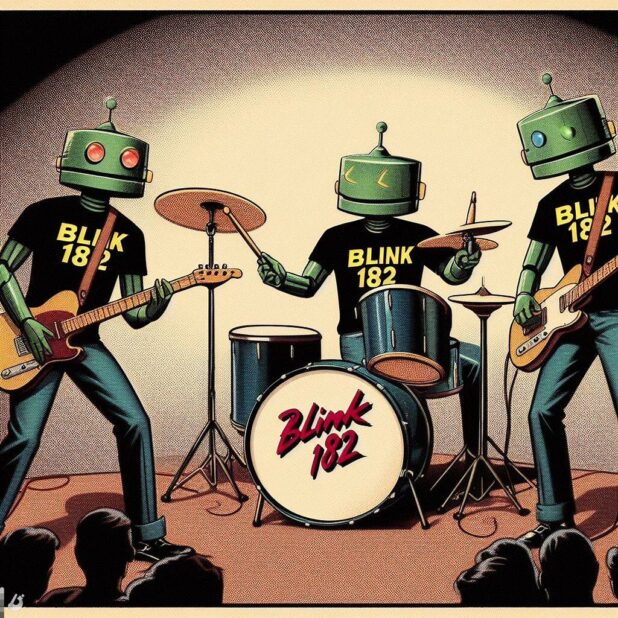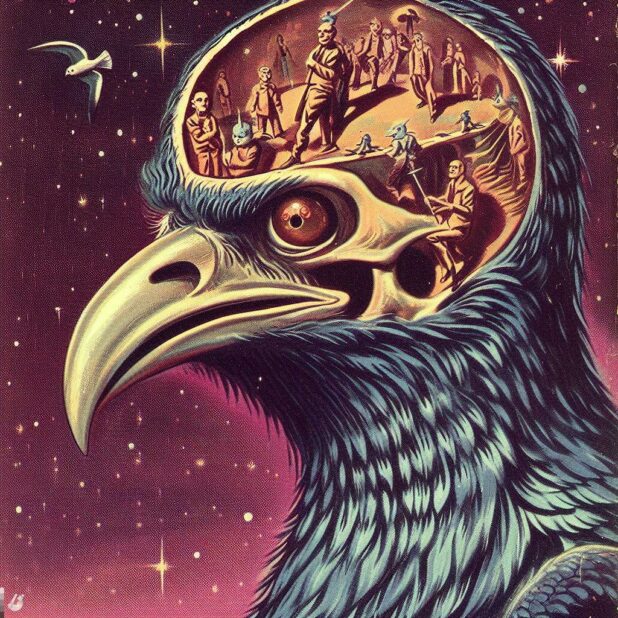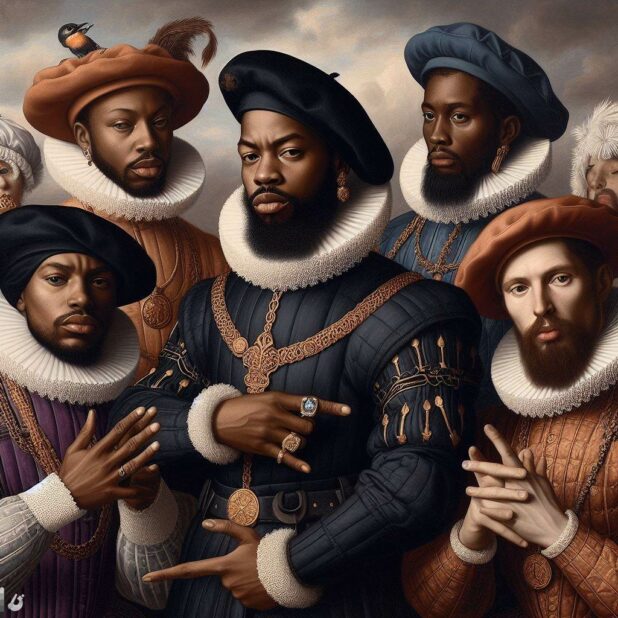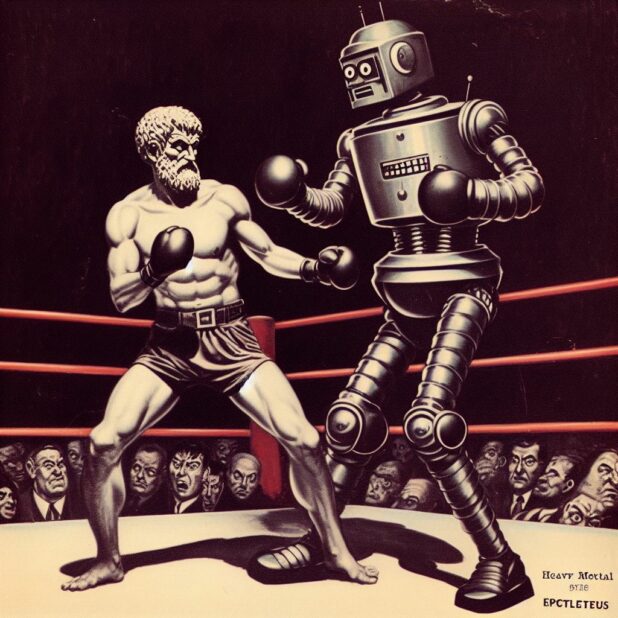As a millennial, I felt some obligation to listen to the new Blink-182 album when it was released. Fascinatingly, I found some serious realizations about our dawning robot future while subjecting myself to this horrible record.
Blink-182 was a defining band of the millennial generation. It’s somewhat unfortunate that this was the case, as the music was not particularly good, but the death of Kurt Cobain in 1994 shocked the nation and the music scene, and led to the “depressing but good” grunge music scene being replaced with childish, simplistic music without any depth.
Blink-182 is classified as “pop punk,” which is a way of saying “rock music made by overgrown teenagers without any kind of sophistication.” This is very different than rock music of the 60s and 70s. The Beatles and The Beach Boys were highly sophisticated, as were pop acts that followed them, including Steely Dan, Fleetwood Mac, and The Grateful Dead. The rock music scene in the 1980s was pretty desolate, but this was buffered by the popularity of primarily British new wave and post-punk bands. The Smiths, New Order, Echo and the Bunnymen, Dire Straits, and Talking Heads were all good 80s bands which could qualify as “popular rock,” even if the American radio stations preferred disgusting hair bands.
In the early 1990s, Sonic Youth was taking off, and then you had all of these bands from Seattle, including Pearl Jam, Soundgarden, Alice in Chains, and Nirvana. You also had heavier “industrial rock” bands linked to the pop rock scene such as Nine Inch Nails, Marilyn Manson, Skinny Puppy, and KMFDM. Whether this music was great or not is debatable (I think Nirvana was good, but the others are questionable), but they were forming a sound that was to define a generation, the millennial generation. For me, the thing I feel is most closely linked to Nirvana’s Nevermind was Radiohead’s The Bends. It was a very gloomy, depressive vibe of aimless rebellion which fit the millennials very well, and probably would have led to some deep insight later on.
When Kurt Cobain allegedly blew his brains out in 1994, it was a kind of “shot heard ’round the world.” It was certainly a shot that rang throughout the music industry, and there was a conscious push to put out less depressing music. I think there was also a legitimate society-wide feeling that the music that had defined the first years of the 1990s was “not helpful.” Again, I must say that I think depressiveness can be a good think if it leads to reflection, but that was not how it was viewed.
The billboard charts had already been largely topped by soulless, boring music for years. It was various forms of “R&B” and “pop” that was not very good, and was not listened to by teenagers or “fashionable people.” It was a lot of holdovers from the 70s and 80s, who had maybe been good, but began making “machine music.” Elton John, Phil Collins, Mariah Carey, REM, U2, Billy Joel, Aerosmith, Eric Clapton, and Janet Jackson are examples of the soulless “easy listening” that dominated the late 80s and early 90s charts (to some extent, you could say Michael Jackson and Madonna were forerunners of this genre, though they were both actually good). There was a move to bring that soullessness into the youth music or rock music scene, and that was epitomized by Blink-182 and the much worse band, Green Day. This was truly the downfall of rock n’ roll music, and it was never to recover.
Kurt died on April 5, 1994. On August 1, the single and video for Green Day’s “Basket Case” was released from their first major record label album Dookie. The song would dominate the rock radio and MTV music video loops, and set the stage for decades of very poor quality music.
The song is fun and seems harmless enough, but unfortunately, it would reverberate throughout time and wreak havoc on society, leading the millennials to become a generation of fat, stupid losers, many of whom are now trannies or worse.
This “pop punk” scene was very much connected to the Warped Tour, which I saw several times as a kid in Cleveland. It’s incredible to think back and remember how attractive women were back then. It’s equally incredible to look back at how terrible the music was. These were three-piece bands playing three cords and yelling. The lyrics were not complex or sophisticated either. It all sounded exactly the same. Every song and every band sounded the same.
But this is what would define the millennial generation, and I think that this particular sound and vibe would be their downfall. We must recognize that music creates a vibe, and that this vibe shapes the people. To an extent, this can be manipulated (by the Jews). Of course, people have to be willing to listen to it to be manipulated by it.
Blink’s first popular album was 1997’s Dude Ranch. Like Green Day’s breakthrough album, there were things to like about Dude Ranch, despite the fact that it was objectively not “good music.” The main single, Dammit, which became a radio hit, was at least ostensibly reflective.
Both Green Day and Blink would go downhill from that “high point” in the mid-1990s.
In 1999, Blink released Enema of the State, which featured a porn star on the cover and starred their immortal single “What’s My Age Again?” The video features the porn star, and they run around naked singing about how they are in their 20s and act like teenagers.
Green Day would go on to record some very popular music, which is the worst music ever made, while Blink-182 at some point in the 2000s broke up (I don’t really remember, but they never recorded any notable music after 2005 or so).
Green Day started singing about how like, George Bush was bad, while Blink continued to make songs about being in high school and having a crush on a girl. The stark departure from the brooding and self-loathing of Nirvana was truly surpassed by the malignant nature of the new themes of rock music.
We think of bands like Good Charlotte or Sum 41 having been spawned from this “pop punk” revolution. However, I would argue that Red Hot Chili Peppers, Fallout Boy, Lincoln Park, Foo Fighters, Matchbox 20, My Chemical Romance, Three Doors Down, Coldplay, and so many other horrible bands from the last 20 years came in the fallout of this vibe check in 1994.
All of the bands are bad. Nirvana was the last good mainstream rock band in history.
Intermission
Forgive the “Brief History of Rock Music” and “Root of the Downfall of the Millennial Race” intro. These “Illness Revelations” articles need to have a bit of weirdness, I think. A bit of winding and waxing and waning.
This genealogy of rock music and the way it affected my generation is something that I think needs more study, as I do believe that generations are in many ways shaped by “vibes” which are defined by music. The culture and the pop music are a feedback loop, where people’s tastes influence the music that is produced, and the music that is produced influences people’s tastes.
I’ve thought a lot about this. I do not believe the millennial generation would be this worthless if it would not have been so heavily influenced by bad music, and I don’t think the music would have been so bad if Kurt Cobain had not died the way he did, when he did.
There was room for self-reflection that could have led to revolution; instead, we got men in their 30s singing about high school romance.
Despite various claims, In Utero was actually a very good album, and we can only imagine what Kurt would have done in the ensuing decades if he’d not had these woman problems in his 20s. Once you hit 30, it’s really hard to care about that stuff.
Fast Forward to Now and Go Directly to Thesis (Do Not Pass Go, Do Not Write 1,000 More Words on The History of Rock)
In 2023, the only rock band to have a #1 album on the Billboard charts was the reunited Blink-182. I listened to this album. It was important to me as a millennial and important to me as a cultural critic.
One More Time is pitched as “men in their fifties singing songs about high school for men in their 30s.” It delivers on its premise.
I expected to be unimpressed, but in fact, while I was certainly unimpressed, the music led me to something much darker and weirder, which is the thesis of this article: I believe that Blink-182’s One More Time was entirely written by AI.
To be clear: I am arguing that both the lyrics and the music were entirely written by AI. I assume that the band recorded the album after the AI spat it out for them. You could go through and examine the lyrics of this album, and compare it to their previous albums, and find that the themes and patterns are exactly the same.
It cannot be proved that this album was written by AI. What can be proved, I believe, is that if the album had been written entirely by AI, it would not be any different than what it is. If you put all the Blink albums into AI, then added some of the other stuff from the genre (the hit singles from Sum 41 and Good Charlotte, for example), and told it to create 17 new songs based on these songs, it would give you this album.
The fact that it could have been written by AI doesn’t mean it was. However, my assertion there is that if it had been written by humans, there would have been something different or original about it. Even if humans didn’t intend to do so, they would add some kind of humanity to it, because humans are humans.
I cannot and will not believe that this was produced by human beings.
A Society of AI Suspicion
The larger point here, of course, is that we are now in a place where we can’t know if anything is produced by human beings.
The inability to tell the difference has already begun, and for me, listening to this Blink album was a big revelation, because even if someone wanted to defend this album, they could not possibly point to any single aspect of it that could not have been done by AI.
I’ve written some (and will surely write more) about the fact that videos on Telegram or Twitter showing supposedly real life events will be entirely faked in the near future. This is going to get to the point where you will not be able to tell if anything you see on video is real. The government is going to declare that they are the only ones that can tell you what is real, and they are in fact building an entire industry for this on these “fact checkers” they have assembled in the media.
Many people will not believe the government, and will accept that there is simply no way to know what is real and what isn’t. This is going to create widespread paranoia and confusion throughout the society. No one really understands what that will lead to. It’s impossible to predict. But in some very real sense, audio and video will have become totally useless, and we, the humans, will be forced to look to one another again, in the real world, or be swallowed up by a machine world of delusion, confusion, and paranoia.
I cannot stress how close we are to this new world. In fact, we are more or less already here. I’ve been seeing pictures on the internet recently, and been unable to tell if they are real. Fake audio has also gotten much better.
Where this gets even weirder is when you consider the fact that you will not be able to tell who in your real life is real, if you don’t speak to them directly, in person. An old friend can call you, and speak with all of his normal speech patterns. You can find out later that he’s a robot. Or, your real friend can call you, and you can spend time wondering if he was a robot.
Moreover, it should be noted, history will be rewritten with “newly discovered” information about history (frauds produced by AI) replacing current understandings of history, and history itself eventually having no meaning at all.
Hermeneutics of AI Suspicion
A “hermeneutic” is a method of interpretation of literature, history, art, or something else. The term in its normal form is most usually used in reference to a method of understanding the meaning of the Bible. The person doing the hermeneutics is called the exegete.
Probably, the most interesting form of scriptural hermeneutics was St. Augustine’s method of interpreting scripture through faith and reason, with the two forming a loop, where faith helps you understand reason and reason helps you understand faith.
Martin Heidegger also had some kind of circular hermeneutics method for interpreting art, but I do not understand it. After the illness, I went and looked it up again, and still could not understand it. (Full disclosure: I don’t think I actually understand anything Heidegger said, beyond the basic critiques of reason and materialism, which were not original. I guess maybe I would like to spend more time on it if I had more time. However, I may prefer to play video games.)
I do, however, understand superficially the expansion on Heidegger’s concept of hermeneutics by Frenchman Paul Ricœur, who said that the only relevance of a text is the ability of the reader (exegete, in this case) to relate it to their own experience. He said that all attempts to understand are an attempt to understand yourself by understanding others. That gets a bit modern for me, but I sort of like it regardless.
While going down that pit, Ricœur also argued that you have to either approach a work with faith, i.e., the belief that it is what it says it is, or suspicion, i.e., an analysis of the hidden purpose that the author of the work had in creating it. Ricœur called his system “the hermeneutics of suspicion.” Obviously, there is some overlap with critical theory, but the latter has an explicit goal of deconstructing established systems, which is a political agenda, whereas the hermeneutics of suspicion relate more plainly to furthering personal understanding.
I am coining this term “The Hermeneutics of AI Suspicion” to refer to the ways in which humans will try to determine whether things in their environment are the result of human work or machine work. It applies to the entire process of trying to figure out whether or not something in the environment is a product of AI.
When I listened to the Blink-182 album, and considered that if it had been made by humans, it would have some trace of a soul that it does not have, some influence from the last 20 years since the albums it was based on were recorded, and concluded that only an AI could make something that exists so far outside of time and space as a monument to the turn of the millennium.
It would also be the hermeneutics of AI suspicion to attempt to figure out whether or not it is your friend talking to you on the phone, or an AI. You will analyze his voice, analyze his inflection, analyze the content of what he is saying, and attempt to understand whether he is truly your friend or a robot.
The same will be true watching videos of war or of events on the street. You will, necessarily, if even against your will, approach anything you see with this sense of suspicion. That is the new reality we live in. It’s not ideal, but it is what it is, and it is going to define the rest of your life whether you like it or not.
Personally, I think it’s hilarious. But I know some people will have more gravity when considering the seriousness of this full collapse of reality, this entrance into a new realm where there is no ability to determine what is real.
Presumably, part of the reason I am able to take this in such a light-hearted way is that I have a brain tumor.








